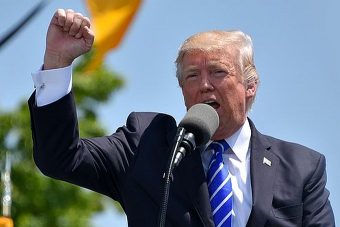
As seemed likely from the day Donald Trump was elected president of the United States, the country will pull out of the global Paris Climate Agreement to reduce greenhouse-gas emissions.
The move had been signaled even before the election by the new president’s choice of noted climate-science denier Myron Ebell as head of his EPA transition team.
Indeed, yesterday, Ebell confirmed that the U.S. would pull out of the global pact under which China, the U.S., Europe, and India all agreed to slash carbon-dioxide emissions over the next two decades.
As recounted in an article by the Reuters news service, Ebell spoke to reporters in London and confirmed the pullout.
“The U.S. will clearly change its course on climate policy,” he said, according to Reuters. “Trump has made it clear he will withdraw from the Paris Agreement.”
Whether that happens immediately by executive order, or as part of a larger package of changes to environmental regulation and the EPA, Ebell suggested, apparently remains undecided.
The Paris climate agreement was negotiated in December 2015 by 193 nations, including the U.S., which had notably declined to ratify its predecessor, the 1997 Kyoto Protocol.
The new agreement took effect last November, after India and the 28 members of the European Union ratified the agreement within days of each other in October. To become binding, the agreement had to be signed by 55 countries, representing 55 percent of global emissions.
Its most important goal is to hold the increase in global average temperature to well below 2 degrees C (3.6 degrees F) above the pre-industrial levels that prevailed in 1700 or earlier.
Any country that has ratified the Paris agreement must wait four years to withdraw, but Reuters quotes a source on the Trump transition team saying there are speedier ways to accomplish that goal.
They include a letter withdrawing the U.S. from the 1992 parent treaty that led to the agreement, issuing a presidential order deleting the U.S. signature on the treaty, or voiding U.S. participation in any activities toward the pact’s goals.
Withdrawing from the United Nations Framework Convention on Climate Change, Ebell said, would be the “cleanest” way to end U.S. involvement.
“The people who elected [Trump] would prefer not to have a seat at the table,” he said. In his London comments, Ebell also discussed the new administration’s plans to slash environmental regulation and ease fossil-fuel extraction and transportation.
He said he expected the political views of Federal Energy Regulatory Commission executives and staff to change “dramatically” under the new president.
Among other duties, FERC reviews applications for the construction and operation of fossil-fuel and electricity transport infrastructure, notably including natural-gas pipelines.
“Given the way the campaign went,” Reuters said Ebell told reporters, “I think you will see very quick executive action to expedite LNG (liquefied natural gas) terminals and pipelines.”
Whether these changes are predicated on the confirmation of Oklahoma attorney general Scott Pruitt to head the U.S. Environmental Protection agency also remains unclear.
Pruitt also denies the accepted science of climate change, and has sued the agency he is nominated to lead a remarkable 14 times to prevent it enforcing its rules.
No date has been set for his confirmation vote by the U.S. Senate; Pruitt appears to be one of the Trump nominees against whom there is most resistance by the minority party.
Source: greencarreports.com

